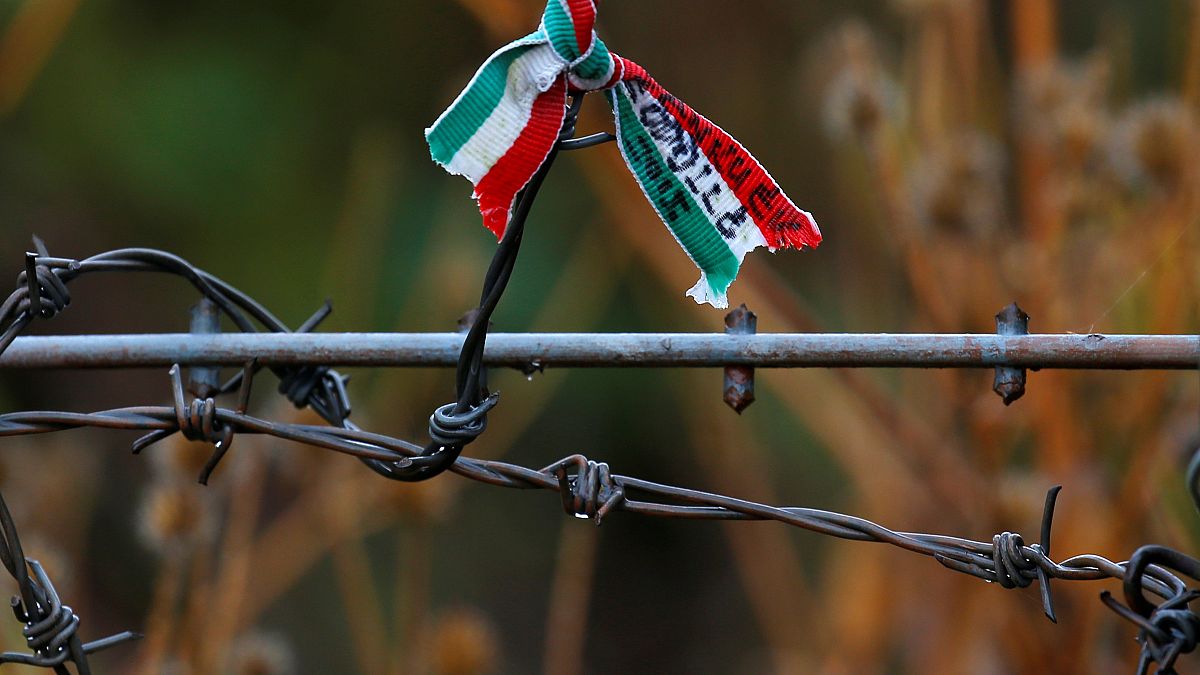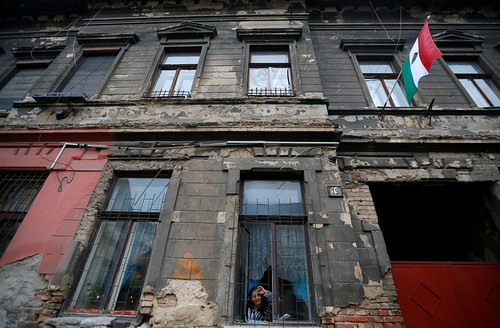Orban’s refugee record slammed as country recalls revolution that had <i>Hungarians</i> fleeing for their lives
Sixty years ago, on October 23, 1956, a peaceful demonstration was getting underway in Budapest that was to trigger one of the tensest moments of the Cold War.
It quickly developed into a full-scale revolt against Soviet rule, attracting tens of thousands onto the streets of the Hungarian capital.
Soviet tanks later moved in to quell the uprising, prompting 200,000 Hungarians to escape the country before the borders were shut.
Tripwires and flashlights
One of them was eight-year-old Peter Martos. His family fled to Austria amid fears his older brother’s involvement in the protests would lead to reprisals.
“Unfortunately we got lost and walked around for hours in the snow and the cold. Then we could see spotlights, and heard dogs barking – all the adventures a child could wish for. I found it all very enjoyable – my parents probably less so,” he told the UN’s refugee agency, recalling their escape to Austria.
“I stepped on a trip-wire that set off an alarm in some distant guard-house. Luckily we weren’t caught.
“Eventually, as we were lost, we lay down next to a silo and fell asleep. As dawn was breaking, someone shone a flashlight in our eyes, blinding us. Fortunately it was a member of an Austrian border patrol: we had, it transpired, already crossed over into Austria. At that time, being a refugee meant being welcome in Austria. Without reservations.”
Austria initially took the majority of the fleeing Hungarians, around 180,000, with the other 20,000 heading to Yugoslavia.
Many were later resettled to other countries, but Austria was widely praised for its ‘outstanding’ response.
‘Can’t find the words’
Martos was one of 410 refugees to remain in Austria, carving out a career as a journalist with Die Presse newspaper, later going on to be its editor.
“Everybody was very kind, everybody was helping,” Martos told Euronews, recalling his welcome in Austria as a young boy.
Sixty years on, Martos’ homeland is again at the heart of a refugee crisis, although this time the boot is on the other foot.
Hungary’s government, led by prime minister Viktor Orban, has been criticised, with Luxembourg’s foreign minister calling for the country to be kicked out of the EU for allegedly treating refugees like ‘wild animals’.
Official data shows Hungary granted asylum to just six percent of asylum-seeking Syrians from April to June this year, compared with an EU average of 98 percent. Meanwhile a ‘toxic’ government-backed referendum campaign linked refugees and terrorism.
So what does Martos, a Hungarian who has benefited from generosity towards refugees, make of Hungary’s stance on those fleeing war?
“My English is not good enough to find the words to curse the Hungarian government, it’s the worst I’ve ever heard, what Hungary has done,” said Martos.
He said he’d had brief moments he had been ashamed to be Austrian and Hungarian, but nothing compares to his current disappointment.
“I feel much more ashamed now to be a Hungarian-born man because of what happens in the Hungarian government, really.”
‘Seductive argument’
Professor Marjoleine Zieck, an expert on refugee law from the University of Amsterdam, told Euronews: “It was good there was no [border] fence in 1956, right? Their [Hungary’s] memories are short and that’s what irritates me personally. What I also find difficult is no-one can choose where he or she is born, so what moral right do we have to deny protection when we plainly can. If we cannot do it in wealthy Europe, who can?”
But Zoltán Kovács, spokesman for Orban, said it was unfair to use the revolution anniversary to criticise Hungary on its refugee response.
“They [critics] say: ‘When Hungarians fleeing the Soviet crackdown were welcomed with open arms in 1956, how can Hungary be so cold in its response to today’s migrants?’
“It’s a seductive argument; after all people love a neat parallel. But all things considered, this argument doesn’t hold up. The two are simply not the same.”
Kovács said Hungarians in 1956 were one identifiable group, whereas migrants arriving in Hungary were from Kosovo, Afghanistan, Pakistan and north Africa.
Martos, moving on to reflect on the welcome of refugees in 1956 and six decades later, said they were different for several reasons. Firstly people are better-off today and are more fearful of losing something to refugees; secondly Syrians are more identifiably foreign – in terms of religion and culture – than Hungarians were to Austrians; and finally that Angela Merkel sparked opposition by being too generous to refugees in the first place.
Empathy
Melita Sunjic, who heads up the UN refugee agency’s communicating with communities department in Vienna, said there was more empathy with refugees in 1956.
“It’s my experience that if you’re closer to the situation of the person you are helping, you feel more empathy, you understand what this person is going through.
“There was really a wave of solidarity [in Austria in 1956], people at that time, which is the amazing thing, were still reeling from the aftermath of World War II.
“The other reason, was geopolitics, anyone coming from a communist country had the benefit of the doubt, people were not questioning their motives why someone. If you came from a communist country you were assumed a real, well-founded asylum claim.
“I think what we saw in the past years in Europe is now it’s [refugee crisis] being seen in a very negative picture, but I’ve also seen a wave solidarity along the migrant route. I worked in the west Balkans last year and I saw refugees come through the poorest parts of Serbia for instance and where the local population were there to help and support and to share with them. A lot of volunteers came from all over Europe to support and help.”

